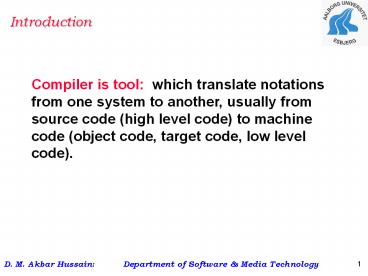Concepts%20of%20Compiler%20Design - PowerPoint PPT Presentation
Title:
Concepts%20of%20Compiler%20Design
Description:
Introduction Compiler is tool: which translate notations from one system to another, usually from source code (high level code) to machine code (object code, target ... – PowerPoint PPT presentation
Number of Views:132
Avg rating:3.0/5.0
Title: Concepts%20of%20Compiler%20Design
1
Introduction
Compiler is tool which translate notations from
one system to another, usually from source code
(high level code) to machine code (object code,
target code, low level code).
2
Compiler
Source Code
Compiler
Target Code
?
Error Messages
3
What is Involved
- Programming Languages
- Components of a Compiler
- Applications
- Formal Languages
4
Programming Languages
- We use natural languages to communicate
- We use programming languages to speak with
computers
5
Component of Compilers
- Analysis
- Lexical Analysis
- Syntax Analysis
- Semantic Analysis
- Synthesis
- Intermediate Code Generation
- Code Optimization
- Code Generation
6
The Input
- Read string input
- sequence of characters
- Character set
- ASCII
- ISO Latin-1
- ISO 10646 (16-bit unicode) Ada, Java
- Others (EBCDIC, JIS, etc)
7
The Output
- Tokens kind, name
- Punctuation ( ) ,
- Operators -
- Keywords begin end if while try
catch - Identifiers Square_Root
- String literals press Enter to continue
- Character literals x
- Numeric literals
- Integer
- Floating_point
8
Lexical Analysis
- Free form languages
- All modern languages are free form
- White space, tabs, new line, carriage return does
not matter just Ignore these. - Ordering of token is only important
- Fixed format languages
- Layout is critical
- Fortran, label in cols 1-6
- COBOL, area A B
- Lexical analyzer must know about layout to find
tokens
9
Relevant Formalisms
- Type 3 (Regular) Grammars
- Regular Expressions
- Finite State Machines
- Useful for program construction, even if
hand-written
10
Interface to Lexical Analyzer
- Either Convert entire file to a file of tokens
- Lexical analyzer is separate phase
- Or Parser calls lexical analyzer to supply next
token - This approach avoids extra I/O
- Parser builds tree incrementally, using
successive tokens as tree nodes
11
Performance Issues
- Speed
- Lexical analysis can become bottleneck
- Minimize processing per character
- Skip blanks fast
- I/O is also an issue (read large blocks)
- We compile frequently
- Compilation time is important
- Especially during development
- Communicate with parser through global variables
12
Syntax Analysis (SA)
13
Semantic Analyserzer
14
Intermediate Code Generation
15
Code Optimization
16
Code Generation
17
Data structure tools
- Syntax tree
- Literal table
- Symbol table
18
Error handler
- One of the difficult part of a compiler.
- Must handle a wide range of errors
- Must handle multiple errors.
- Must not get stuck.
- Must not get into an infinite loop (typical
simple-minded strategycount errors, stop if
count gets too high).
19
Kinds of errors
?
20
Sample compiler
- TINY Pages 22-26, 4-pass compiler for the TINY
language based on Pascal. - C-Minus based on C Pages 26-27 and Appendix A.
21
TINY Example
- read x
- if x gt 0 then
- fact 1
- repeat
- fact fact x
- x x - 1
- until x 0
- write fact
- end
22
C-Minus Example
- int fact( int x )
- if (x gt 1)
- return x fact(x-1)
- else
- return 1
- void main( void )
- int x
- x read()
- if (x gt 0) write( fact(x) )
23
Structure of the TINY Compiler
- globals.h main.c
- util.h util.c
- scan.h scan.c
- parse.h parse.c
- symtab.h symtab.c
- analyze.h analyze.c
- code.h code.c
- cgen.h cgen.c
24
Conditional Compilation Options
- NO_PARSE Builds a scanner-only compiler.
- NO_ANALYZE Builds a compiler that parses and
scans only. - NO_CODE Builds a compiler that performs semantic
analysis, but generates no code.
25
Listing Options (built in - not flags)
- EchoSource Echoes the TINY source program to the
listing, together with line numbers. - TraceScan Displays information on each token as
the scanner recognizes it. - TraceParse Displays the syntax tree in a
linearlised format. - TraceAnalyze Displays summary information on the
symbol table and type checking. - TraceCode Prints code generation-tracing
comments to the code file.































